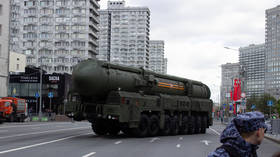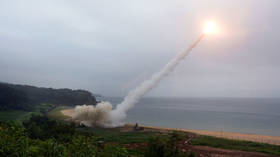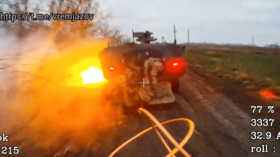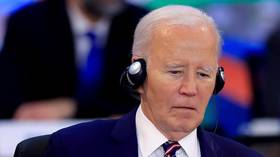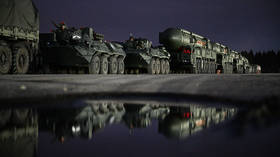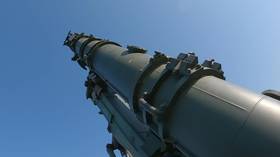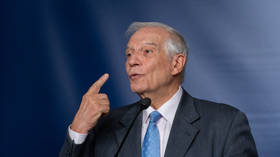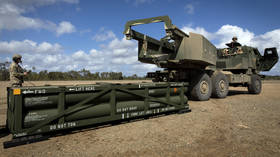Nordic leaders pledge allegiance to NATO at Washington summit
Leaders of five Nordic countries have vowed to work with the US in “deep partnership based on shared fundamental values” on a range of issues, from climate change and refugees to the “Russian threat,” as NATO deploys more military hardware in the region.
“The world would be more secure and more prosperous if we just had more partners like our Nordic partners,” said President Barack Obama, flanked by Finnish President Sauli Niinisto and Prime Ministers Lars Loekke Rasmussen of Denmark, Sigurdur Ingi Johannsson of Iceland, Erna Solberg of Norway, and Stefan Lofven of Sweden.
Obama muses "Why don't we just put all these small countries in charge for a while? And they could clean things up". https://t.co/ILqKVkX166
— Nick Ford (@nickford) May 13, 2016
The Friday summit in Washington, DC was a follow-up to the 2013 meeting of the six countries in Sweden. While covering a range of topics including climate change, the refugee crisis to the Arctic and gender equality, the summit’s key point was presenting a united front against Russia, Reuters reported.
“The United States and the Nordic countries are concerned by Russia’s growing military presence in the Baltic Sea region, its nuclear posturing, its undeclared exercises, and the provocative actions taken by Russian aircraft and naval vessels,” the six leaders said in a joint statement. “We call on Russia to ensure that its military maneuvers and exercises are in full compliance with its international obligations and commitments to security and stability.”
They also denounced Russia’s “illegal occupation and attempted annexation of Crimea, its aggression in Donbas, and its attempts to destabilize Ukraine” and pledged to keep the sanctions in effect until Russia returned Crimea to Ukrainian control.
New #Russia military activity map. Russia aggressive posture vs. @NATO in Baltic&Black Sea. https://t.co/4r9d5IEH86pic.twitter.com/sPM6FGRD15
— ISW (@TheStudyofWar) April 30, 2016
At the same time, the six countries said they “recognize the need for an appropriate dialogue with Russia to be maintained… to address issues of common concern, including the counter-ISIL campaign and ongoing efforts to negotiate an end to the conflict in Syria.”
READ MORE: NATO greedy for geopolitical space, wants to encircle those who disagree – Lavrov
“If you have no independent policies, you lean towards those who will ‘take care’ of you,” Jan Oberg, director of the Sweden-based Transnational Foundation, told RT. The crisis in Ukraine was the result of the 25-year expansion of NATO, which should have been dissolved when the Soviet Union fell apart, he added.
Established in 1949, NATO expanded to the Russian border in 1999, following the alliance’s Kosovo War. The Baltic states of Estonia, Latvia and Lithuania – former Soviet republics that gained independence in 1990 – were incorporated in 2004.
Washington has accused Russia of “provocative” behavior over two incidents in the Baltic Sea, as US aircraft and Navy vessels that approached Russian territory were greeted by Russian interceptors getting “up close and personal.” Russian fighters buzzed the USS Donald Cook missile destroyer off the shore of Kaliningrad in mid-April, while another did a barrel roll over a US spy plane two weeks later.
“Either do not fly near our borders, or turn on transponders for automatic identification by our radars,” Russian Defense Ministry spokesman Major-General Igor Konashenkov told the US military following the spy plane incident.
“There is a strategy, over the last 20 years,” to get Sweden and Finland closer to NATO, said Oberg. Denmark, Iceland and Norway are already members. Though Sweden and Finland are officially neutral, in 2014 they were accepted into the alliance’s Enhanced Opportunities Program.
“The Nordic countries greatly value the United States' commitment to Europe and its security. NATO remains key to transatlantic and European security, and the contributions of Sweden and Finland, including those they make as NATO enhanced opportunity partners, are highly valuable,” said the joint statement on Friday.
Moscow maintains that NATO is using scaremongering tactics to justify demands for increased defense spending by European members and greater US military presence in the Baltics, Scandinavia and Eastern Europe. Russia’s response has been to strengthen its own troops on the western border.



